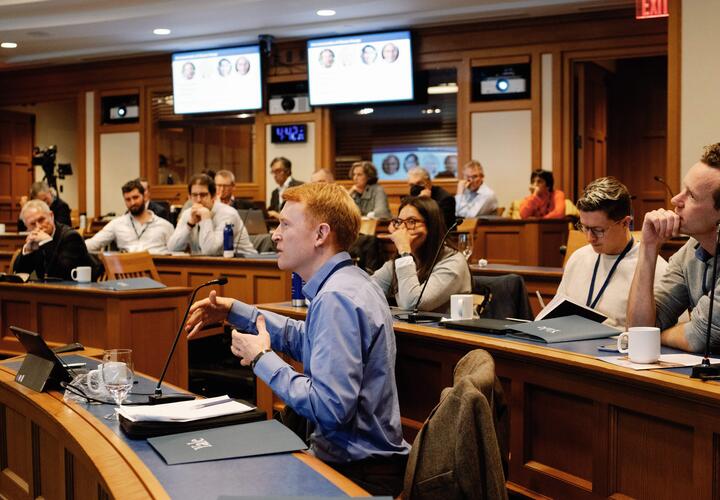Nicholas Ryan Sees New Possibilities for Environmental Regulation in Emerging Markets
Professor Ryan explores the challenges low- and middle-income countries face in expanding access to energy while also reducing the health and environmental costs of energy production.

How does climate change affect the future of economic development? What role does economics play in energy markets? In the interview below, Associate Professor of Economics Nick Ryan discusses his recent research on energy and environmental policy in emerging markets. Ryan talks about the trade- offs low- and middle income countries face between expanding access to energy, while also reducing the health and environmental costs of energy production. Nick and colleagues have worked directly with policymakers to improve environmental regulation, and their work could offer a model for expanding energy access and lowering pollution around the globe.
You have a pretty unique focus on energy markets and environmental regulation. How did you end up on this path?
I went into grad school knowing that I was really interested in economic development for a lot of the reasons many people are. Why are developing countries so much poorer? What are the obstacles to growing rich and adopting technology from rich countries? I was also interested in studying firms, because when you look at many highly developed countries, you have a lot of big firms that organize a huge amount of economic activity. These kinds of firms are also hugely important in energy markets, so I saw an opportunity to fuse these things.
What does your current research look like in this area?
My research primarily concerns energy markets and how those markets can be designed to operate at a very low cost—that is, to get energy of any kind, but particularly renewable energy, into a position where everybody can use it, especially people in poor countries. So, for example, that could be microgrids for solar in rural Bihar, in India, where people don’t have access to electricity. That could be designing new contracts to get solar plants onto the grid at a lower price, so electricity suppliers are offering power as cheaply as they can, that is competitive with existing plants. Or that could be just changing the rules of the power market so that the most efficient existing sources of energy are used as much as they can be.
Absent technological change or absent pushing a new regulation, there are opportunities to lower costs and use less energy to accomplish the same work in the economy—part of my research is pointing out opportunities to do that by changing the design of electricity markets.
Voices in Development
 Listen to Nick Ryan on Season 2, Episode 1 of the Economic Growth Center’s Voices in Development Podcast, which explores issues related to sustainable development and economic justice in low- and middle-income countries.
Listen to Nick Ryan on Season 2, Episode 1 of the Economic Growth Center’s Voices in Development Podcast, which explores issues related to sustainable development and economic justice in low- and middle-income countries.
Listen
What role does economics play at this current moment of energy transition?
There’s been huge technological progress for renewable energy generation, for solar and for wind especially, and to an extent battery storage. These things continue to become much, much cheaper, and are starting to ripple out through the economy in developed and developing economies. That opens a huge possibility to roll out these technologies at a huge scale to countries that are concerned about costs.
However, you can’t just swap out a coal plant for a bunch of solar panels, one for one, and expect everything to work as it did before. You need changes in markets, in prices, in regulatory institutions to try to absorb and best use these new sources of energy. That’s where energy, economics and the study of these energy markets is very important to build up the kinds of institutions that will allow countries to adopt renewable energy cheaply and at a massive scale. Understanding how markets respond to energy transitions, to the incentives and opportunities created by cheaper renewable power, is the focus of a whole new wave of economic research.
One of your recent papers looks at how households in different contexts choose between sources of electricity—what did you find there?
That paper is “Demand for Electricity on the Global Electrification Frontier,” with Robin Burgess (LSE), Michael Greenstone (UChicago), and Anant Sudarshan (Warwick). What we study is the choice households have between different kinds of electricity: what do they pick and why? And to say kinds of electricity is weird because electricity is the same. It’s the same wherever it is. It’s just electrons being pushed through a wire. But now in many poor countries, people do have a choice in how that’s delivered and where they get their electricity from.
For example, you might plug into a government-built electricity grid, or you might buy a solar system on your own. What we see now is that in many of the places where people don’t have electricity from the grid, solar has taken off as a really popular option. In Mali, around 60% of households have a solar system. In Uganda, in Tanzania, it’s above 40%. We wanted to understand how and why households make that decision, so in Bihar, India, we looked at what households did as the grid arrived and as solar got cheaper. We also looked at how sensitive they are to the costs and reliability of these options.
What we find is that households are actually glad to get solar power because it’s pretty cheap, so it makes them much better off than they were before when they were sitting waiting in their village with no grid connectivity. But when the grid does arrive, that tends to push the solar systems out. The reason for that in part is that the government is subsidizing grid energy so that It’s even cheaper than these small-scale solar systems that many households could buy for themselves.